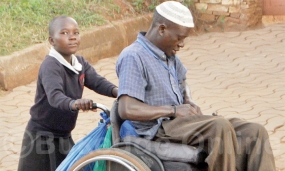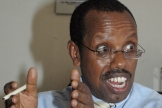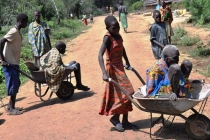The Secretary to the Treasury, Mr Keith Muhakanizi who kept calling himself “ born again Christian” was today pushed on the wall and forced to apologise for the “inefficiencies” in the running of a Shs 90 billion facility meant for helping the poor farmers access cheap credit.
The Parliament’s Public Accounts Committee noted “gross inefficiencies, conflict of interest and lack of supervision of the funds” on the part of Bank of Uganda and Ministry of Finance. Because of lack of supervision, PAC Chairperson Ms Alice Alaso said, the money has gone to the well-off farmers at the expense of the poor farmers and written off more than Shs499 million in bad debts.
On December 3 2009, the Governor Bank of Uganda Prof Emmanuel Mutebile wrote to Ministry of Finance, saying that Bank of Uganda could not monitor the implementation and evaluation of the facility, citing conflict of interest however to date, Mr Muhakanizi had not taken action. The ST apologised for “inefficiency” saying “he is also human”.
The committee expressed concerns about the possible risk to the funds and ordered Muhakanizi to streamline the monitoring of the scheme within one month. Officials from BoU told the committee that they signed a Memorandum of Understanding with Ministry of Finance and clearly STATED that monitoring of the agriculture
credit facility will not be their mandate.
Mr Muhakanizi returns to PAC next week.
But The suffering goes on without any social welfare in this poor African country:

Nakasango nga asindika kitawe bagende okusabiriza ssente.
Taata Omusoga ava e Iganga ate nga mulema oluusi antuma okumugulira bamalaaya wano mu Kampala:
By Lawrence Kitatta
Added 21st September 2016
Nakasango anyumya bw’ati:
Nzuukuka ku makya ng’obudde tebunnakya ne tutegula ebikunta oluvannyuma taata bw’aba yeetewuulizzaako mu kaveera nkakwata ne nkasuula mu kipipa kya Kcca ekiri e busukkakkubo. kyokka oluguudo ndusala mmagamaga emmotoka zireme kunkoona.
Bwe tuba twasuze n’amazzi tunaabako mu maaso era tunywako oluusi ne njolekera Kiswa gye nsoma mu P1.
Taata eyandibadde ampa ssente za bodaboda okuntwala ku ssomero ate nze mba nnina okumusindika ku kagaali nga tuva e Lugogo we tusula ku mulyango gwa GTZ.
Olumu ku ssomero anzigyayo ssaawa 4:00 ne tugenda ku kkubo gye tusabiriza. Olumu nsoma naye olulala nnemererwa.
Olusoma oluwedde nakola ebibuuzo era okuva olwo saaddayo kusoma. Buli lunaku tuzunga ekibuga kumpi okukimalako ne mpulira nga n’obugere bunfuuyirira.
Kasango ng’azingako akaveera akakola nga bulangiti e Lugogo okumpi ne siteegi ya New Vision, we basula ate Nakasango nga yeetereza batandike olugendo lw’okubuna ekibuga nga basabiriza.
Naye taata bw’atuuka ku kaserengeto olwo ng’anteeka mu maaso ng’akagaali kayiringita. Taata yangamba nti maama wange ye Nasim Namulondo abeera Iganga era gye yanzigya okundeeta e Kampala okutandika okusabiriza ku luguudo.
Enkuba bw’etonnya mu budde obw’ekiro olwo ne tuyimirira ku lubalaza we tusula olumu n’okutukuba etukuba naddala ng’erimu kibuyaga.
Obudde buli lwe buziba mba mu kweraliikirira. Taata oyo talina nsonyi antuma okumuyitira bamalaaya ekiro!
Omanyi bwe tuba twebase nsula ku ludda kw’assa ebigere wabula olumu ngenda okusisimuka nga mpulira anninnya mu maaso, ngenda okulaba nga mukazi.
Olumu mpulira n’amaloboozi ekiro naye nga sirina kyakukola. Bw’aleeta bamalaaya nga sinneebaka olwo nsituka busitusi ne ntuula ku kkubo mu kayumba ka siteegi ya New Vision okutuusa lwe bamaliriza naye ate olumu nneekanga nsuze awo. Olumu antuma e Nakawa ngule sooda.
Wano nga beetegeka okugenda.
TAATA YANZIBA AWAKA
Bwe yali yaakandeeta okunzigya mu kyalo ng’annyambaza nnyo engoye z’abalenzi nga tayagala bamulaba kumanya nti ndi muwala naye kati nange nnyambala ngoye z’abawala.
Nzijukira nali mbeera ne maama wange ne jjajja, twali tuzannya ne baganda bange be twabeeranga nabo awaka, abakulu tebaaliwo kw’olwo taata yajja awaka n’anzibawo n’antwala ewa jjajja omulala.
Ono kirabika ye maama we amuzaala wabula nga naye saamwetegereza bulungi era simumanyi. Taata bwe yawulira nti gye yanzigya baali batandise okunnoonya kwe kunzigyayo n’andeeta e Kampala.
Kye nzijukira twatuuka kiro era ekkubo eryatuleeta sirimanyi naye angamba nti ewaffe Iganga we wali ekyalo kyaffe.
Wabula okuva lwe natandika okubeera ne taata embeera tebeerangako nnyangu kuba ennaku ezisinga tusiibirira capati n’amazzi emmere tugirya lumu na lumu ate tugirya Kataza Bugoloobi kuba we wali eya layisi gy’asobola okugula.
Eno ku 1500/- tufuna ebijanjaalo n’akawunga ate ennyama ya 3,000/- naye ennyama emirundi gye nnaakagiryako mbala mibale ate essowaani tugigabana.













Make A Comment
Comments (0)